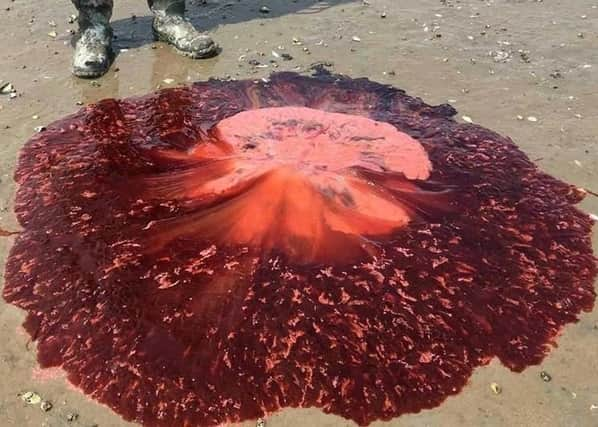Beach-goers warned of giant stinging jellyfish


Kilkeel Coastguard posted a warning on social media stating: ‘‘The Lion’s Mane Jellyfish is one of the largest known species of jellyfish, usually reaching a length of 40cm, some individuals grow up to 2m long.
‘‘These mysterious creatures have been spotted washed up on a number of Northern Ireland beaches in the past few days.
Advertisement
Hide AdAdvertisement
Hide Ad‘‘The Lion’s Mane jellyfish uses its stinging tentacles to capture, pull in, and eat prey such as fish, sea creatures, and smaller jellyfish.’’
It added:‘‘Anyone finding a lion’s mane jellyfish washed up on the beach should also be aware that the tentacles of this species retain their potent sting long after the jellyfish has died, and dead specimens should therefore never be touched under any circumstances.
‘‘If your dog comes into contact with a Lion’s Mane Jellyfish, immediate veterinary attention is advised as anaphylactic reactions are not uncommon.’’
Portia Sampson, displays supervisor at Exploris Aquarium , Portaferry, added: ‘‘We would not want the public to go anywhere near these type of jellyfish, especially if they are fully mature, they can give a very, very nasty sting and it can be extremely painful.
Advertisement
Hide AdAdvertisement
Hide Ad‘‘If you have any allergic reactions, for example, to bee stings, then you could be in a lot of trouble.’’
She added: ‘‘If you are stung, get yourself to a water tap as soon as possible and get some hot water, as hot as you can bear, running over it, because that will deactivate the sting and should stop the pain.
‘‘You might find for a few days afterwards you’ll get a rash, so just put some antiseptic cream on it and it should go away no problem. But if you do have an allergic reaction or have sensitive skin, contact your doctor.’’
Ms Sampson added this type of jellyfish is common to the UK.
Advertisement
Hide AdAdvertisement
Hide Ad‘‘The UK has a few different types of jellyfish. The most common would be the moon jellyfish, they are very safe, you get them all over the world and they don’t cause any harm to humans. The other ones you get around the UK and Ireland are the Lion’s Mane and the Blue Fire ones, which are a bit more rare, but equally as painful.
‘‘Occasionally if we get some strange weather, you might get ones washed up from more tropical climes, but that is very rare.’’
Comment Guidelines
National World encourages reader discussion on our stories. User feedback, insights and back-and-forth exchanges add a rich layer of context to reporting. Please review our Community Guidelines before commenting.